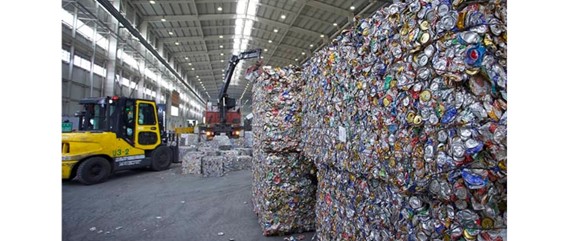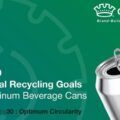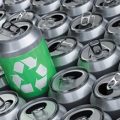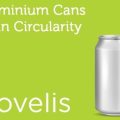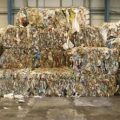The multinational company Novelis, the world’s largest aluminum recycler, is on a mission to make America give a new life to every aluminum can. In all states, recycling has become a general term that does not always differentiate materials, but in fact, the processes and efficiency of plastic, glass and aluminum recycling are different and do not follow a homogeneous standard process.
A 2020 report commissioned by Can Manufacturers Institute shows that more than 80% of aluminum cans are converted back into new beverage containers, compared to only 59% of glass bottles and 13% of polyethylene terephthalate (PET) plastic bottles. Many are also unaware that recycling aluminum requires only 5% of the energy required to create new aluminum, which means that recycling efforts could be an important part of a developing circular economy in the U.S.. while in countries such as Brazil, aluminum can recycling rates are close to 100%.
In contrast, in the case of the U.S. it sees a rate of only 45%. That’s why Atlanta-based Novelis, the world’s largest aluminum recycler, is leading the charge to increase these aluminum can recycling levels and is poised to far exceed the 80 billion aluminum beverage cans it already recycles annually.
According to a 2022 study by Ball, the 90% aluminum can recycling rate in the U.S. would eliminate 1.3 million tons of landfill material, reduce CO 2 emissions by 12.1 million metric tons and save the equivalent of more than 90 million barrels of oil per year. “Creating a culture of recycling, as well as strong incentives and adequate infrastructure, leads to cleaner cities where people enjoy better health and a shared sense of purpose in caring for their environment,” notes Steve Fisher, president and CEO of Novelis.
In addition, the study also reveals that an increase in aluminum can recycling would also have significant economic benefits. Ball’s study predicts that the 90% threshold would contribute nearly 104,000 jobs in collection, sorting and reprocessing to the economy, and generate $1.6 billion in economic activity through the sale of materials. “Aluminum is the most valuable material in a recycling garbage can. It is unique because it is a truly circular material and can be reused indefinitely without degrading its quality,” says Fisher who adds that “beverage cans, in particular, have one of the fastest recycling cycles. A can recycled today can be transformed into a new can and returned to a store shelf in as little as 60 days. Novelis has the ability to recycle almost all used beverage cans, if we can get them.”
Despite challenges such as low consumer recycling rates in the U.S. and the lack of a consistent recycling infrastructure, Fisher says a combination of awareness and government action, including public-private partnerships, can help increase accessibility and encourage more people to recycle.
Governments can act by establishing modern systems that encourage the recycling of aluminum cans. In some areas, these programs have already proven successful: recycling rates are 75% in the 10 U.S. states with a deposit refund system, compared to only 35% in the 40 states without one.
The multinational company Novelis continues to join efforts in both recycling and as a means to reduce its carbon emissions. “Our goal is to reduce our carbon footprint by 30% by 2026 and to be carbon neutral by 2050 or sooner. We cannot do this alone; it will require a concerted and collective effort across the value chain. The impact could be a game-changer and bring us even closer to a truly circular economy,” concludes Fisher.

